Travel
Pharmacists Have a Significant Role in the Prevention of Travel-Related Diseases
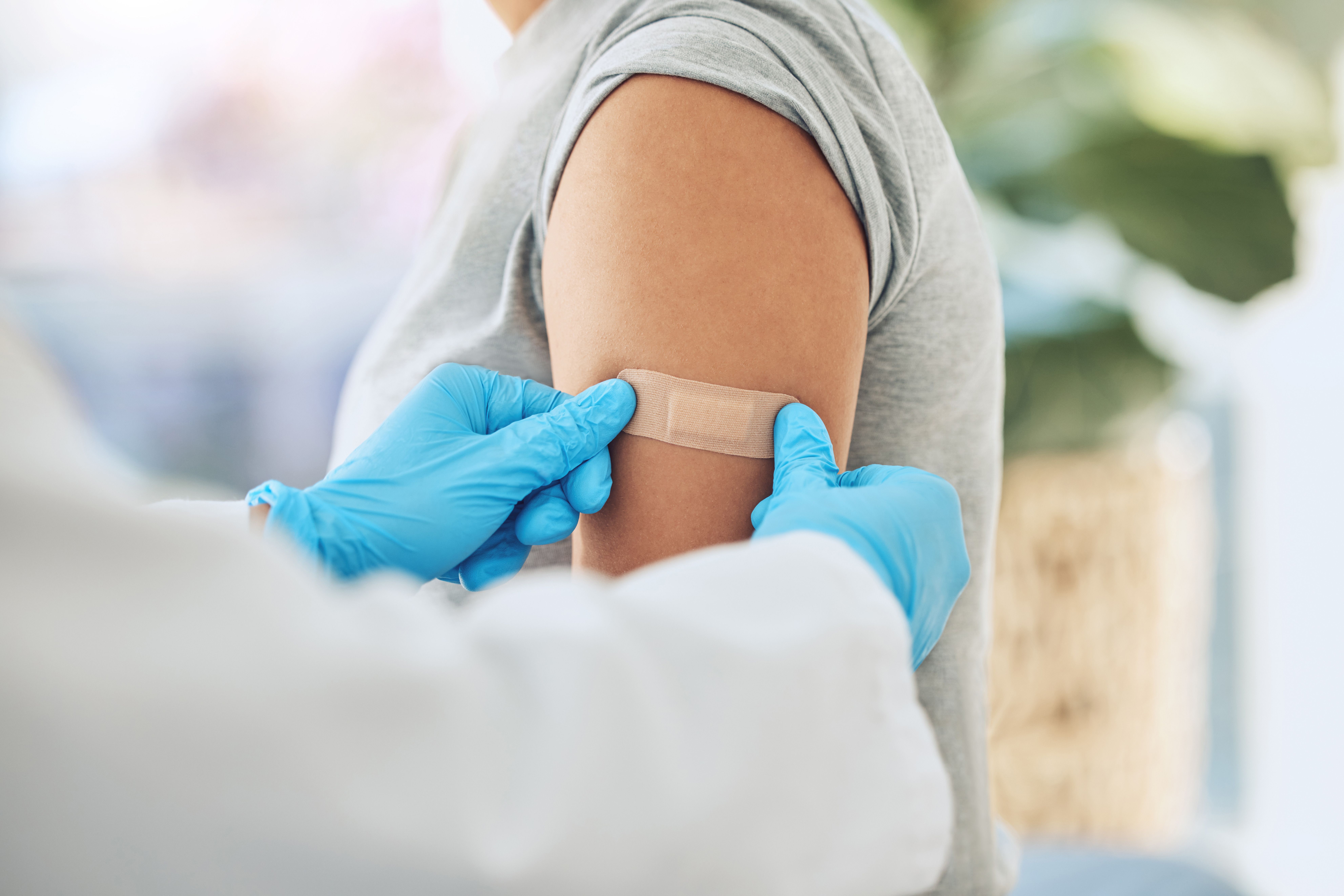
Introduction
Image credit: Azeemud-Deen Jacobs/peopleimages.com | stock.adobe.com
The number of US residents traveling overseas has exceeded pre-COVID-19 pandemic numbers.1 According to the latest tourism data from the United Nations, approximately 790 million tourists traveled internationally in the first 7 months of 2024.2 International tourism is projected to continue to grow in the future, with an estimated 1.8 billion international travelers by 2030.3 With travel, however, also comes the risk of travel-related diseases which can be acquired based on travel location, duration of stay, purpose of the trip, planned activities, the current season, living standards, risk behavior, and the traveler’s health status.4 Despite the risk of travel-related disease, travel health services can be readily available which aim to provide preventative care prior to a trip, treatment if travelers get sick, and post-travel follow-up.
Pharmacist’s Role in Travel Health
Pharmacists can play a key role in providing travel health services and preventing travel-related infectious diseases. A systematic review aimed to evaluate the types and outcomes of pharmacist-managed travel health services, and it found that pharmacists involved in travel medicine play a wide variety of roles as depicted in Figure 1. Additionally, travelers who utilized pharmacy travel health services reported feeling highly satisfied with their care, and there was a good acceptance rate of recommendations made by pharmacists.5 Community pharmacies are well suited to provide travel health services because they can be readily accessed by patients, are associated with a high level of patient trust, and already serve functions such as patient counseling and vaccine administration, which align with services needed for travel health.5,6
Depending on the state, pharmacists can administer vaccines, prescribe and dispense medications or supplies, order and interpret labs, and provide travel-related patient counseling either independently or under a collaborative practice agreement with other health care professionals.7,8 Specialized travel health training may be required prior to providing services. Local pharmacy laws can be referenced to determine which travel vaccines pharmacists are eligible to administer and if they have prescriptive authority for travel medications.9
Figure 1: Roles of Pharmacists in Travel Health
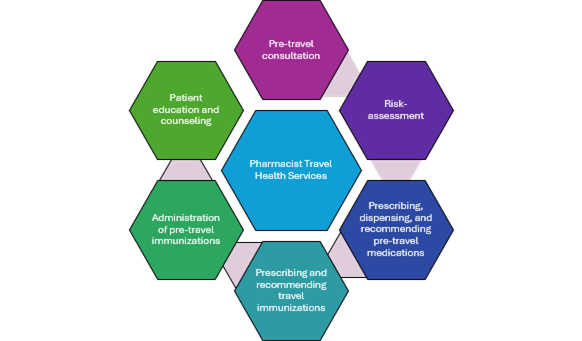
To prevent the spread of travel-related infectious diseases, planning is of the utmost importance. The CDC and World Health Organization recommends a pre-travel health consultation 4 to 8 weeks prior to travel.8 It is important to remember that obstacles such as cost, accessibility, lack of awareness, and health disparities sometimes prevent travelers from seeking guidance for their upcoming travel plans.7 Travelers who participate in a pre-travel health consultation, however, may have more motivation for illness prevention.3
A pharmacist should take the following into consideration before making travel health recommendations:
- The patient’s travel destination and health risks associated with that area
- The patient’s past medical and immunization history
- Recommended pre-travel vaccines as well as dates of travel and time to immunity for those vaccines
- Chemoprophylaxis to prevent disease (in some cases)10
- The patient’s trip itinerary, because certain activities may put the patient at risk for exposure to certain pathogens that are endemic
- Non-prescription medications9
- Drug interactions, patient allergies, and patient specific factors, such as underlying conditions and pregnancy status, when recommending particular medications
For assistance with determining appropriate vaccines and chemoprophylaxis based on travel destination, pharmacists can consult the CDC Yellow Book.10 In addition, an interactive tool is available from the CDC where travel health notices, vaccines recommendations, medication, and counseling points populate based on the user’s selected travel destination.11
Travel Immunizations
The type of travel vaccine required depends on specific details of travel plans. The most up to date guidance can be found in the CDC Yellow Book. It is important that travelers are up to date with routine vaccines as well.10 Table 1 shows common preventable travel-related diseases, vaccines available, high-risk geographic locations, recommended time to receive vaccine before travel, and estimated duration of protection after vaccination.
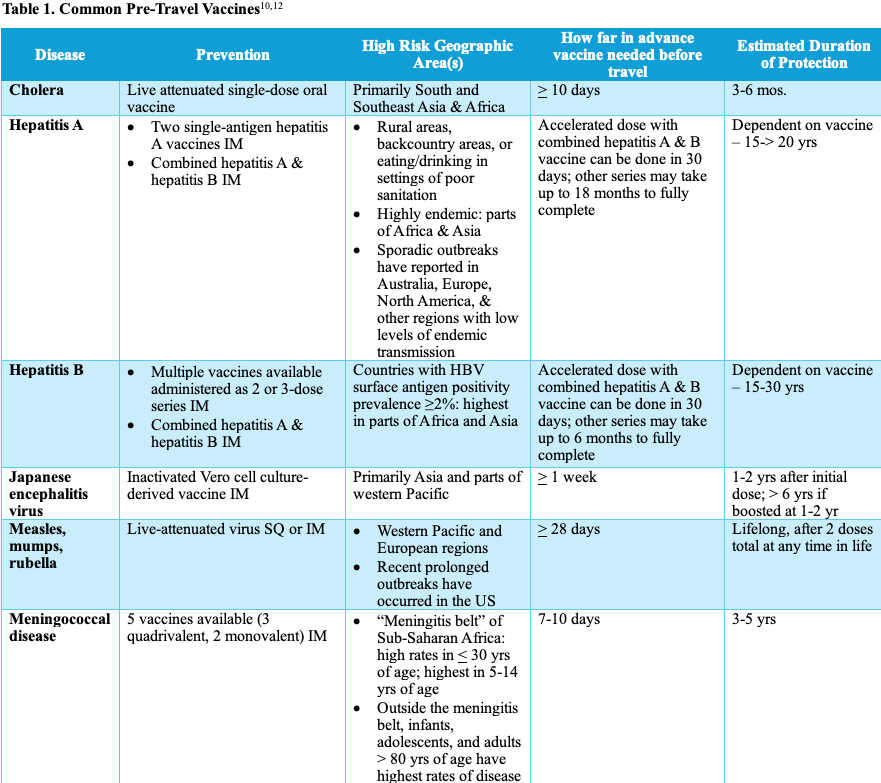
mos, months; IM, intramuscular; yrs, years; YF, yellow fever; SQ, subcutaneous; measles, MMR, mumps, and rubella; WPV, wild poliovirus; VDPV, vaccine-derived poliovirus; DTaP, diphtheria-tetanus-acellular pertussis; DT, diphtheria-tetanus; Tdap, tetanus-diphtheria-acellular pertussis; Td, tetanus diphtheria; TTCV, tetanus toxoid-containing vaccine
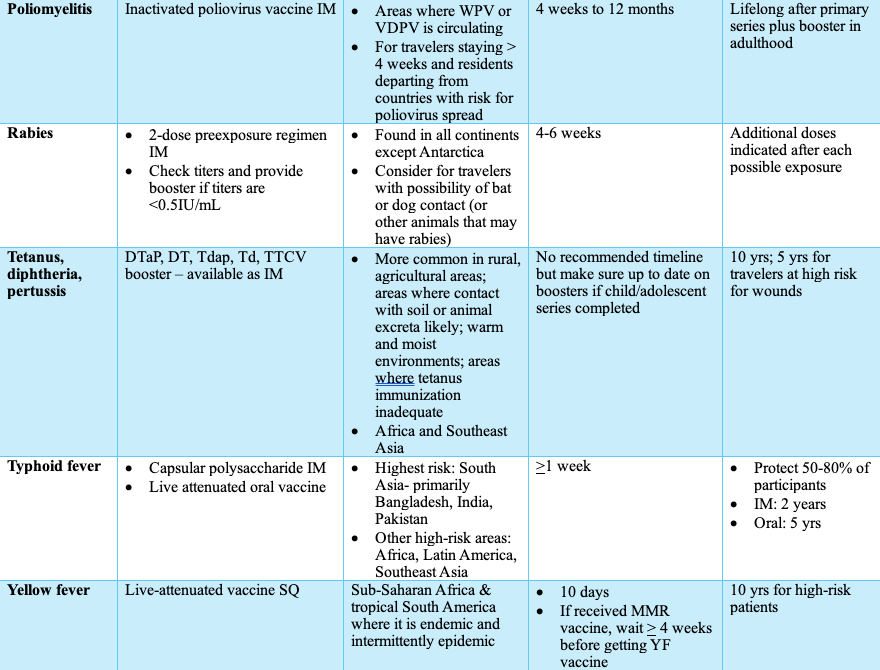
Pharmacists primarily work in pre-travel health care, focusing on preventive services; however, if an illness occurs during travel or after returning, they can provide nonprescription drug recommendations or refer patients to primary care or infectious disease specialists when appropriate.7 Pharmacists can assess the need for referral by considering factors such as the timing of illness in relation to travel, presenting symptoms, immunization and prophylaxis history, travel itinerary and duration, potential exposures, and any underlying health conditions. While certain travel-related illnesses—such as diarrhea—may resolve on their own, it is crucial to identify when a patient requires specialized care to prevent or manage more serious conditions.10
Travel Health Training and Certification for Pharmacists
There are several resources available for pharmacists interested in obtaining further training and qualifications in travel health (Table 2). The American Pharmacist’s Association (APhA) offers a Pharmacy Based Immunization Delivery certificate training program which is based on national education standards set forth by the CDC for immunization training.13 Additionally, they offer an advanced competency training program for pharmacists with immunization certification interested in providing travel health services to patients.14 The International Society of Travel Medicine (ISTM) offers a Certificate in Travel Health™ for health care professionals who are demonstrating expertise in the field. Certification can be obtained via examination.15
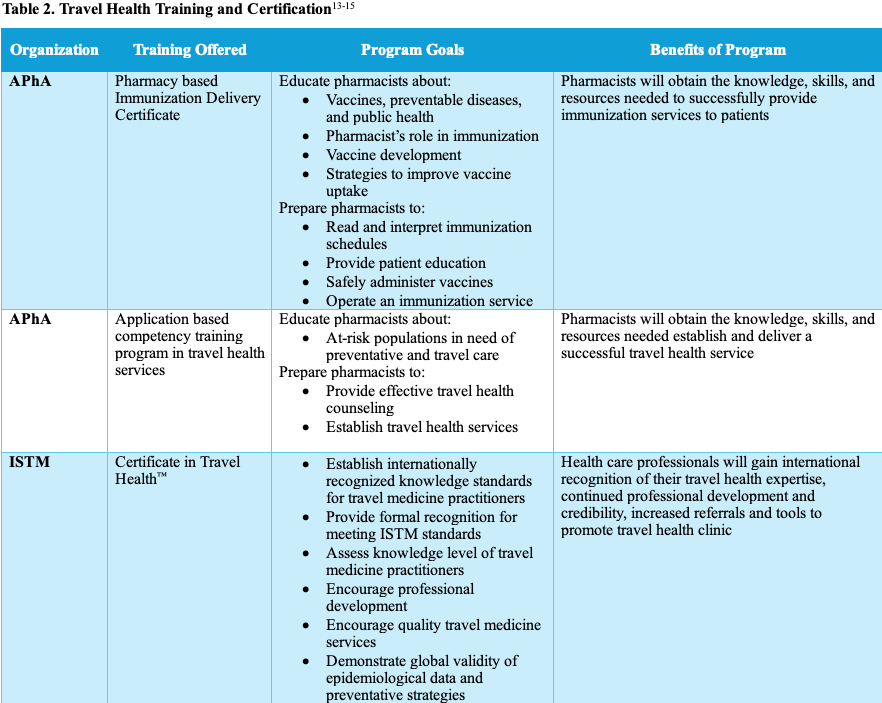
Conclusion
As international travel continues to increase, so does the risk of acquiring travel-related diseases. The role of the pharmacist in travel health may include preventative care such as immunizations and medications, patient counseling, and risk-assessment. Pharmacists are well positioned to provide travel health advice because they are easily accessible, highly trusted, and carry an expertise in medications and vaccines. Additionally, there are several opportunities for pharmacists to obtain specialized training in this area. With the growth of international tourism, pharmacists can play a pivotal role in the prevention of travel-related disease.
REFERENCES
-
National Travel and Tourism Office. Number of United States residents travelling overseas from 2002 to 2023 (in millions). In Statista. Accessed September 16, 2024 https://www.statista.com/statistics/214774/number-of-outbound-tourists-from-the-us/
-
United Nations Tourism. UN Tourism Barometer. Accessed September 20, 2024 https://www.unwto.org/un-tourism-world-tourism-barometer-data
-
Angelo KM, Kozersky PE, Ryan ET, Chen LH, Sorir J. What proportion of international travellers acquire a travel-related illness? A review of the literature. J Travel Med. 2017;24(5): doi:10/1093/jtm/tax046
-
Sørensen HT. Patients with Chronic Diseases Who Travel: Need for Global Access to Timely Health Care Data. Clin Epidemiol. 2022;14:513-519. doi:10.2147/CLEP.S360699
-
Bhuvan KC, Alrasheedy AA, Leggat PA et al. Types and outcomes of pharmacist managed health services: A systematic review. Travel Med Infect Dis. 2023;51: doi:10.1016/j.tmaid.2022.102494
-
Bascom CS, Rosenthal MM, Houle SKD. Are pharmacists ready for a greater role in travel health? An evaluation of the knowledge and confidence in providing travel health advice of pharmacists practicing in a community pharmacy chain in Alberta, Canada. J Travel Med. 2015;22(2): 99-104. doi:10.1111/jtm.12172
-
Hurley-Kim K, Goad J, Seed S, Hess KM. Pharmacy-based travel health services in the United States. Pharmacy. 2018;(1):5. doi:10.3390/pharmacy7010005
-
Hurley-Kim K, Babish K, Chen E, Diaz A, Hahn N. The U.S. travel health pharmacists’ role in a post-COVID-19 pandemic era. Pharmacy. 2022;10(134). doi:10.3390/pharmacy10050134
-
Shoreland. Pharmacy travel health clinic operations guide. 2019; Accessed September 20, 2024. https://www.shoreland.com/downloads/pdf/PharmacyClinicGuide.pdf
-
Centers for Disease Control and Prevention. CDC Yellow Book 2024: Health Information for International Travel. Oxford University Press
-
Centers for Disease Control and Prevention. Traveler’s Health: Destinations. Accessed September 20, 2024. https://wwwnc.cdc.gov/travel/destinations/list
-
Freedman DO, Chen LH, Kozarsky PE. Medical considerations before international travel. N Engl J Med. 2016;375(3):247-260. doi:10.1056/NEJMra1508815
-
American Pharmacists Association. Pharmacy-based Immunization Delivery. Accessed September 22, 2024. https://www.pharmacist.com/Education/Certificate-Training-Programs/Immunization
-
American Pharmacists Association. Pharmacy-based travel health services. Accessed September 22, 2024. https://www.pharmacist.com/Education/Certificate-Training-Programs/Travel-Health
-
International Society of Travel Medicine. ISTM Certificate of Knowledge™ in Travel Medicine. Accessed September 22, 2024. https://www.istm.org/wp-content/uploads/2024-candidate-bulletin.pdf

/static.texastribune.org/media/files/f5fdb1dff4d6fd788cba66ebaefe08d0/Paxton_GOP_Convention_2018_BD_TT.jpg)






